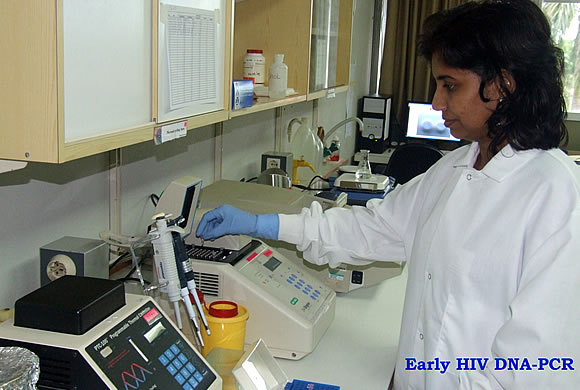Properly functioning antiretroviral therapy for HIV-infected infants is available in Suriname, but unfortunately could not be used due to lack of diagnostics. To overcome this problem, in 2009, at the request of the Ministry of Health and the National AIDS Program (NAP) and with funding of the regional funds of the Pan Caribbean Partnership against HIV/AIDS (PANCAP), the Medical Scientific Institute (MWI), set up the early detection of the HIV virus itself, by means of the Polymerase Chain Reaction (PCR) technology.
In order to achieve a high test sensitivity, three regions of the HIV – virus are examined. The diagnostics that have been set up can detect different sub-types of the HIV-1 virus. An additional innovation for Suriname is the use of dried blood spots (DBS) in HIV testing. The use of DBS provides several advantages such as ease of blood sampling, improved transport and storage capabilities and lower security risks for health workers.
As of December 7 2009, the department of Biochemistry has made this test available in Suriname. This test has now been integrated into the national PMTCT (Preventing mother to child transmission) program, which basically allows testing of all babies born to HIV-infected mothers in Suriname. In this context, lab personnel of all hospitals, the Mother & Child Care Bureau of the State Hospital and the Medical Mission were trained by the department on how to collect samples. Therefore, all hospitals are now using the same protocol when collecting samples.
To guarantee the quality of the developed HIV diagnostic system, the laboratory is affiliated with the international HIV-1 DBS Proficiency Testing Program of the Centers for Disease Control (CDC) and has consistently received a test score of 100% in the External Quality Assessment (EQA) rounds.
Newspaper article: MWI verbetert perspectieven hiv-geïnfecteerde zuigelingen

